As the world’s most popular CMS, WordPress websites are a vulnerable target for hackers and scammers worldwide.
Don’t assume your site is too small for extra security. It’s relatively common for fraudsters to target smaller sites, as these are easier targets than larger websites with advanced security protocols.
Regardless of your site size or industry, every WordPress website is at risk for a hack or data breach. From global ecommerce sites to small businesses and personal blogs, WordPress security must be a top priority for everyone.
Not sure where to start? This guide will steer you in the right direction.
What is WordPress Security?
WordPress is an open-source CMS with some built-in security protocols. However, this won’t be enough to protect your site out of the box.
Common WordPress security issues include brute force attacks, malware, cross-site scripting, SQL injections, file inclusion exploits, and more. People often ask, is WordPress secure? The platform itself is very secure, as long as you’re following security best practices.
However, there are vulnerabilities in WordPress plugins, themes, and even some core functions of WordPress. Fortunately, there are ways for you to beef up that security.
5 Tools to Improve WordPress Security
There are hundreds, if not thousands, of ways to increase the security of your WordPress website. But these five tools listed below are my favorites.
#1 — WP Engine
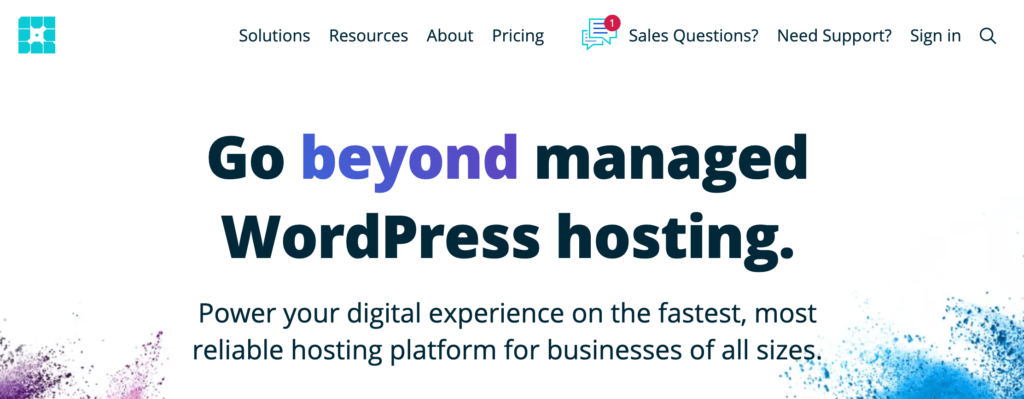
WP Engine is a web hosting provider built specifically for WordPress users. It’s trusted by 1.2+ million sites in over 150 countries across the globe. As a fully managed WordPress hosting service, WP Engine has exceptional support available 24/7.
WP Engine also takes additional steps to improve the security of your WordPress site. Examples include automatic updates, daily backups, continuous site monitoring, and managed upgrades. The service is optimized for WordPress, which ultimately boosts the speed and reliability of your site, in addition to enhanced security.
WP Engine blocks over 109 million attacks on WordPress sites daily. So you can rest easy knowing that your hosting provider is actively protecting your website from vulnerabilities.
Since WP Engine is a managed hosting provider, all of the security and speed protocols are handled at the server level. So you won’t have to worry about installing extra plugins or backups with third parties to protect your site from attackers.
All of this is handled for you behind the scenes. WP Engine has a plan for everyone.
#2 — SiteGround
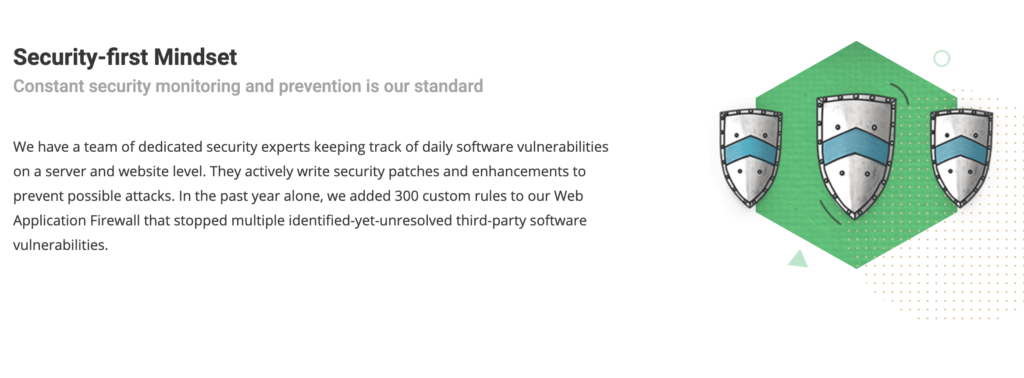
SiteGround is another industry leader in the web hosting space. Over 2+ million domains worldwide rely on SiteGround as a hosting provider.
One of the reasons why SiteGround ranks so high on my list is because of its managed WordPress services. You’ll benefit from WordPress installation, automatic updates, and enhanced security features. The automatic updates help eliminate lots of the vulnerabilities associated with running a WordPress site.
It’s also one less thing you have to worry about doing manually, and you can even control how soon after a release your site gets updated.
If you sign up for a managed WordPress plan from SiteGround, you’ll benefit from security management at the server and application level.
Again, this means you don’t need to get extra plugins or tools from third-parties to protect your site. Your hosting provider will handle the bulk of the heavy lifting for you.
SiteGround automatically updates instances to the latest version and patches them against common WordPress exploits through the server firewall. Daily backups and a free SSL certificate will protect your site as well.
#3 — Jetpack
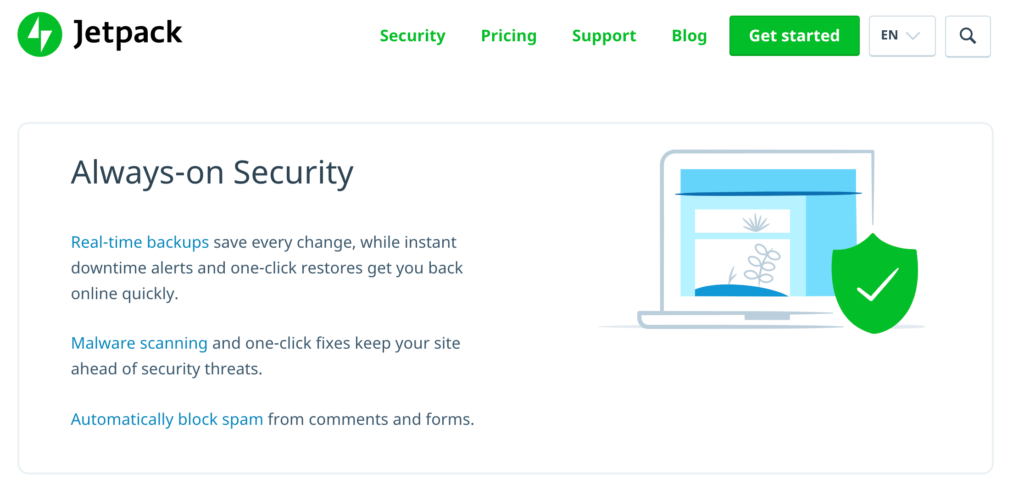
Jetpack is one of the most powerful WordPress security plugins on the market today. This tool has over five million active installations, and it’s constantly being updated to protect against new threats.
Jetpack is so popular because it does much more than just secure your WordPress site. It automatically scans for malware and code threats, monitors uptime and downtime, blocks spam comments, and more. The plugin even offers real-time and automated site backups.
Another top feature of the Jetpack WordPress security plugin is its ability to protect against brute force attacks on your WordPress login page. You can also use it to add 2FA (two-factor authentication) as an added layer of protection to your site.
The plugin allows you to manage individual plugins for site maintenance and updates, ensuring that your entire WordPress ecosystem is secure.
As a bonus, it’s worth noting that Jetpack also has tools for design, growth, speed, performance, and so much more. Install at now to any WordPress site as a fast way to improve security.
#4 — Bluehost
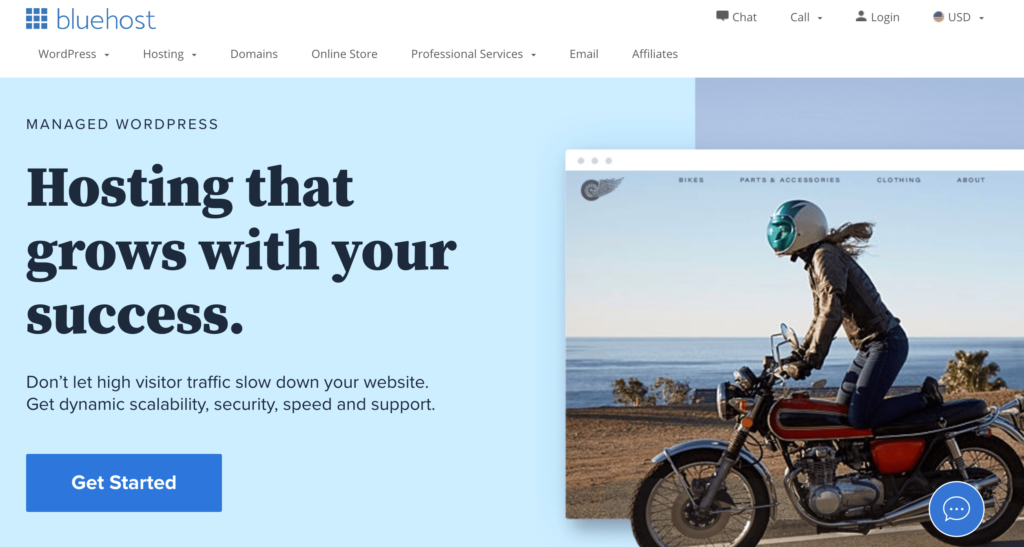
No list of the best WordPress security tools would be complete without mentioning Bluehost.
As one of the most reputable and reliable hosting services globally, Bluehost is also a recommended hosting provider by WordPress.
So it’s no surprise that more than two million sites rely on WordPress for web hosting. In addition to basic hosting plans, WordPress provides next-level managed WordPress hosting. These packages are perfect for high-traffic sites that want to add an extra layer of protection to WordPress.
Top features and benefits of a managed WordPress plan from Bluehost include a free SSL certificate, daily backups, malware detection and removal, domain privacy and protection, automatic updates, spam protection, and more.
They even protect against DDoS attacks, brute force attacks, and bot blocking with a multi-tiered security system. Depending on the managed plan you choose, you’ll get a Jetpack Personal, Jetpack Premium, or Jetpack Professional plan included with your subscription.
#5 — BackupBuddy
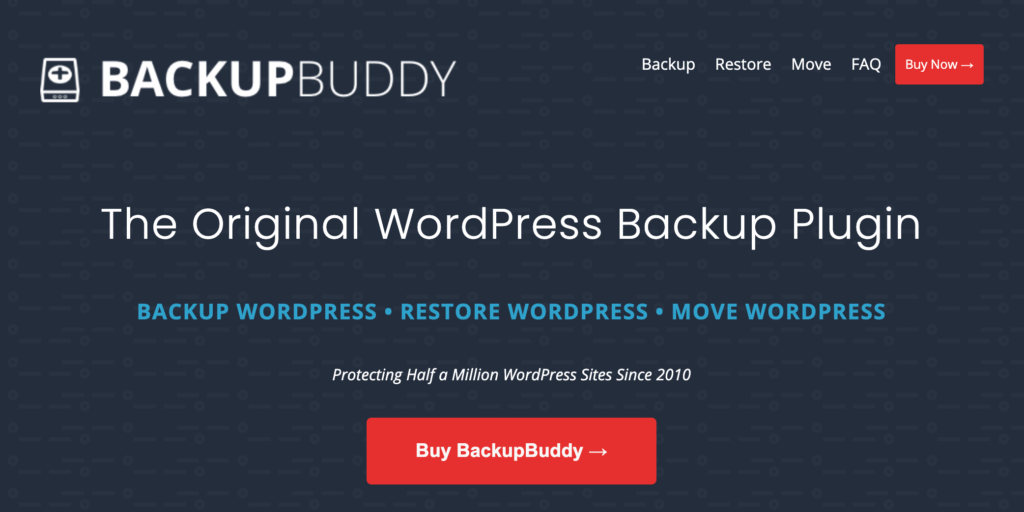
BackupBuddy is a bit unique compared to some of the other tools on our list. Technically, it doesn’t add a layer of protection or levels of security to your WordPress site.
However, the plugin makes it easy to backup your site (hence the name), allowing you to restore your site in the event of a hack or security breach. So if something goes wrong and your site has a security problem, you can rest easy knowing that everything is backed up with BackupBuddy.
I like this plugin because it’s super easy to install and use. You can create and manage your backups with a few simple clicks.
Unlike other backup tools on the market, BackupBuddy backs up everything, including widgets, plugin files, media library uploads, users, core WordPress files, posts, pages, comments, settings, and more.
It’s the perfect safety net for sites that fall victim to hacks, malware, server crashes, deleted files, bad commands, or even user error. BackupBuddy has protected over 500,000 WordPress sites for more than a decade, so you know it’s a tool you can rely on.
The Basics of WordPress Security
Let’s take a closer look at the core components of WordPress security. This will make it much easier for you to protect your website.
Secure Web Hosting
Securing your WordPress website all starts with the right web hosting provider. In addition to the tools mentioned earlier in this guide, check out our list of the best web hosting for WordPress.
If you want top-of-the-line security, choose a managed web hosting plan. The majority of your security protocols will be handled at the server level from your hosting service.
So you won’t have to worry about add-ons or other third-party tools. Lots of the best hosting providers offer 24/7 monitoring and support as well.
Another benefit of using a secure hosting provider is the maintenance. Updates and other maintenance requirements will be handled for you behind the scenes.
SSL and HTTPS
HTTPS protocol needs to be at the top of your priority list. This has become a minimum requirement in today’s day and age for site security. HTTPS lets your site visitors know that the connection between your server and their web page is secure and hasn’t been altered by a hacker.
The easiest way to get HTTPS for your WordPress site is by getting an SSL certificate. You could get one from a third-party certificate authority, but your hosting provider should have one for you. All of the best WordPress hosting services offer free SSLs.
Not only will SSL and HTTPS improve your site security, but they will also improve your SEO strategy. Google penalizes websites that haven’t implemented these security best practices.
Security Monitoring and Attack Prevention
There are so many potential threats out there that could harm your website. Spam, viruses, malware, DDoS attacks—the list goes on and on.
Monitoring and prevention tools can stop these threats before they cause a problem for you or your site visitors. As previously mentioned, many WordPress hosting providers offer these types of services. If not, you could always install a WordPress security plugin to beef up your security.
Settings and User Permissions
Sometimes vulnerabilities come from internal sources. Maybe you let an employee or contractor access your WordPress site, and they were careless with their login information.
Don’t grant everyone access to your site. If you need to give someone access, make sure they have their own user login credentials. This allows you to manage individual permissions based on access level. So every user won’t necessarily have the ability to make changes on your site or alter the security settings. Giving everyone their own login credentials also holds them accountable. If there’s a breach or foul play, you’d be able to trace where it’s coming from. That’s not possible if five team members are sharing a single username.
Backups
No WordPress security tool is 100% foolproof. There’s always the possibility that something can go wrong, even if you’re doing everything within your power to secure your website.
In the event of a hack or security breach, you want the ability to restore your site and its data as quickly as possible. That’s why you need to backup your site daily.
Some hosting providers will handle this for you. If not, just use a WordPress backup plugin. Now you can rest easy knowing that your site will be restored, even after data loss has occurred.
3 Tricks For Boosting WordPress Security
As someone who has managed dozens of WordPress sites throughout my career, it’s safe to save that I’ve learned a thing or two about security. I want to share some quick tips and hacks that you can use to improve your site security ASAP.
Trick #1: Use WordPress-Specific Hosting
WordPress-specific web hosting is the best way to secure your site. These hosting solutions are optimized for WordPress, and the bulk of security is maintained at the server level.
Another reason why I recommend a WordPress-specific hosting provider is because you’ll benefit from excellent support. These providers are experts in WordPress security. So they know how to handle problems, and they proactively update security protocols as WordPress changes and new vulnerabilities become a threat.
Your provider will install security updates and ensure that WordPress is installed correctly. It’s also common for WordPress hosting providers to offer automatic backups, so you won’t need to install a backup plugin or anything like that.
Trick #2: Leverage Automatic Updates
WordPress gets updated a few times a year. Like any software, these updates are designed to fix bugs and improve security. But if you don’t update to the latest WordPress version, your site could be vulnerable to new threats.
That’s why it’s so important to take advantage of automatic updates. Trying to keep track of every new release and installing an update manually on your own is a tedious task.
The best WordPress hosting providers will take care of these updates for you.
Trick #3: Get a Free SSL
As previously mentioned, an SSL (secure sockets layer) certificate has become a must-have for every website. It adds an additional layer of security to your website and protects visitors from hackers trying to steal their data.
SSLs typically range anywhere from $50 to $150 per year. Some go as high as $300 or even $500.
Fortunately, you don’t need to pay for an SSL certificate. The best hosting providers will give you one for free with your hosting service. If your hosting provider is not offering a free SSL, it’s time to consider switching.
from Quick Sprout https://ift.tt/3t2psXH
via IFTTT
No comments:
Post a Comment